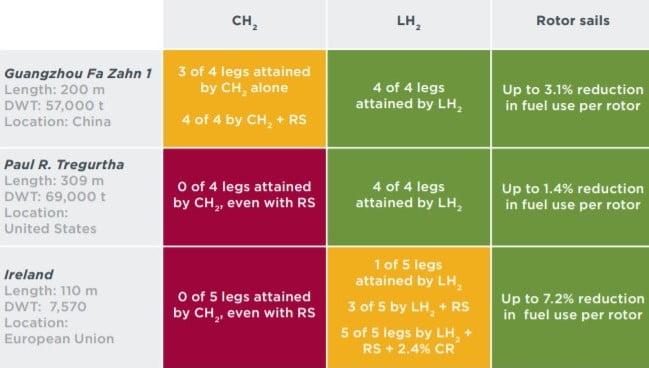The International Council on Clean Transportation (ICCT) published a new study, investigating the potential of both liquid and compressed hydrogen fuel cells to replace fossil fuels for bulk carriers, including when paired with wind-assisted propulsion in the form of rotor sails.
The study modeled three bulk carriers:
- A 57,000 deadweight tonne (dwt) coastal dry bulk carrier sailing in China;
- A 69,000 dwt ore and coal carrier sailing the North American Great Lakes;
- A 7,570 dwt cement carrier in northern Europe.
It also used 2019 AIS ship traffic data and weather data observations to estimate the ships’ total energy use and the energy-saving potential of rotor sails for two routes for each ship.
Across the three ships, ICCT found benefits from the rotor sails and several port-to-port energy savings of 0.1% to 7.2% per rotor.
The two larger ships had lower relative savings compared to the smaller ship because the power generated by the rotor is smaller relative to the total power used by the engines
the report says.
More specifically, using liquid hydrogen (LH2), the two larger ships could complete both of their modeled routes even without the help of wind-assisted propulsion.
Rotor sails also had the greatest energy-saving potential for the European bulk carrier and were capable of port-to-port energy savings up to 7.2% per rotor.
“With four rotor sails, energy savings of up to 28% or more are possible,” notes ICCT, adding however that the smaller European bulk carrier does not have as much space available on board for LH2, making reliance on hydrogen more challenging for this ship than the other two. In fact, only the shortest of the five legs could be achieved with LH2 alone. Two other legs could be achieved using rotor sails in combination with LH2. As for the two longest legs, they could be achieved if it replaced 2.4% of its cargo space with LH2 in combination with four rotor sails.
Furthermore, using compressed hydrogen (CH2) presents its own challenges, as only the Chinese bulk carrier could use this fuel to complete its typical operations.
It could achieve three of the four legs we modeled using CH2 alone and could achieve the fourth leg with the addition of six rotor sails. The other two ships do not have enough space available to carry enough CH2 to meet their energy needs along the routes we modeled
the study found.

This research also examined the factors that affect energy savings from rotor sails. It found that energy savings vary depending on wind conditions and are sensitive to wind speed and wind direction.
Energy savings are also sensitive to how quickly the rotors spin:
- Too slow and they do not generate much thrust;
- Too fast and they consume more energy than they save.
The size of the rotor sails also affects performance, as taller rotors result in greater energy savings. Lastly, overall energy savings increase as the total number of rotors increases.
Ships powered by wind-assisted propulsion paired with liquid hydrogen fuel cells would generate no direct pollution
ICCT believes. Nonetheless, it mentioned that “the hydrogen would need to be sourced from renewable energy and not fossil fuels to have climate benefits.”
As for rotor sails, they can reduce the amount of fuel that ships consume and can be retrofitted on existing conventionally fueled ships to reduce fossil fuel consumption. In addition, they can also be installed on new ships, including hybrid and zero-emission vessels, to save on energy costs.
As such, they are able to help ships comply with international regulations such as the Energy Efficiency Design Index and Energy Efficiency Existing Ship Index, or domestic regulations that limit the carbon-dioxide-equivalent intensity of ships.
Knowing that rotor sails can reduce energy use and emissions for new and existing ships could give governments the confidence to raise the ambition of climate policies
the study concludes.


































































